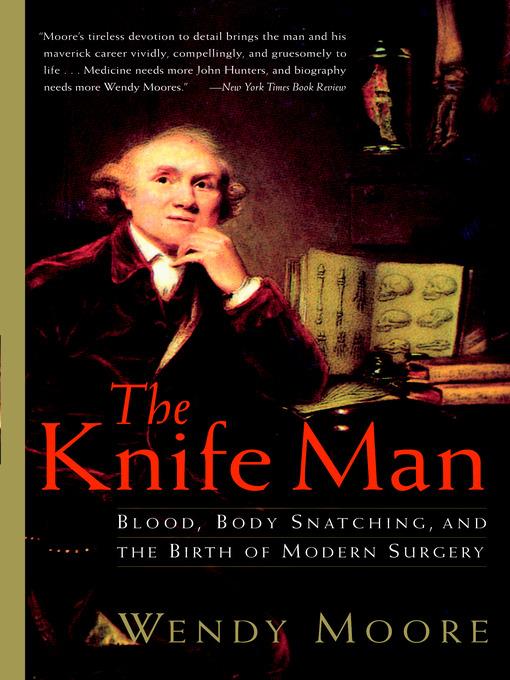
The Knife Man
Blood, Body Snatching, and the Birth of Modern Surgery
کتاب های مرتبط
- اطلاعات
- نقد و بررسی
- دیدگاه کاربران
نقد و بررسی

August 29, 2005
Brilliant anatomist, foul-mouthed and well met, avid empiricist and grave robber, John Hunter cut an astonishing figure in Georgian England. Born in Scotland in 1728, he followed his brother, a renowned physician, to London and into the intellectually grasping, fiercely competitive world of professional medicine. With ample servings of 18th-century filth and gore, Moore offers a vivid look at this remarkable period in science history, when many of the most impressive advances were made by relentless iconoclasts like Hunter. In an age when ancient notions of bodily humors still smothered medical thinking, Hunter challenged orthodoxy whenever facts were absent—which was usually the case. A prodigious experimenter—to the point of obsession—he dissected thousands of corpses and countless animals (many of them living) in his effort to define the nature of the human body. Yet he was also an early adherent of medical minimalism, shunning bloodletting by default and advocating physical therapy over invasive surgeries. This is a deftly written and informative tale that will please readers of science history, period buffs and everyone in between.

Starred review from September 15, 2005
John Hunter, the almost forgotten 18thcentury polymath (and possibly the inspiration for Robert Louis Stevensons Dr. Jekyll and Mr. Hyde) finally gets the biography he deserves in British journalist Moores first book. At a time when medical practice favored bleeding, purging, or amputation for virtually any problem, the relentlessly curious Hunter relied on close observation and innovative experiments to revolutionize battlefield medicine, dentistry, and a host of surgical techniques. A skilled anatomist of animals and humans, he also made informed speculations on the age of Earth and the common ancestry of apes and men, which shocked more conventional members of the Royal Society (who, were they alive today, would surely be displeased to hear that Hunters famous museum still exists in part at the Royal College of Surgeons in London). Although squeamish readers and PETA members may want to avert their eyes, Knife Man is highly recommended for academic and large public libraries.Kathy Arsenault, Univ. of South Florida Lib., St. Petersburg
Copyright 2005 Library Journal, LLC Used with permission.

October 15, 2005
Sometimes watershed achievements in science and medicine, such the Salk polio vaccine, are lastingly linked to a name, and sometimes not. Moore depicts John Hunter as a man to whom modern surgeons are hugely indebted, yet few outside of medicine have heard of him. The eighteenth-century English surgeon made his mark--though some of his contemporaries likely would have preferred the word " scar--"by departing radically from accepted surgical procedures of the day. In an era when practitioners relied upon the centuries-old knowledge of the second-century Greek physician Galen, Hunter was a revolutionary who "believed all surgery should be governed by scientific principles, which were based on reasoning, observation, and experimentation." Without setting tradition aside and dissecting and experimenting on human cadavers and live animals, which garnered Hunter much contempt from colleagues and neighbors alike, he would never have accomplished his goals. Moore's telling of his story is detailed and often grisly but engrossing throughout.(Reprinted with permission of Booklist, copyright 2005, American Library Association.)

























دیدگاه کاربران